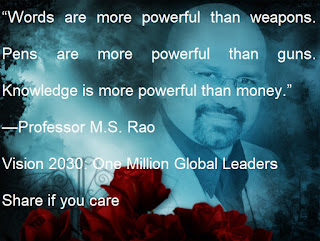“An ounce of practice is
worth a thousand words.” ―Mahatma Gandhi
Leadership is leadership
irrespective of the regions and nationalities. However, there are some aspects
that differ leadership from region to region. When you look at leadership in
Asia especially India, it is unique because leaders often hail from established
families. Whether it is in business, politics, sports or film industry, people
with family lineage and connections in a specific industry or area excel
quickly and acquire the title of ‘leader’ in India. But can we call them
natural leaders? Of course, not. In this
context, let us look at leadership from
Indian perspective versus the rest of the world.
Indian
Leaders
“In a gentle way, you can
shake the world.” ―Mahatma Gandhi
In India, several leaders
emerged in the name of caste, religion, region, language and community without any
ideology. People supported them because the leaders belonged to their
communities. They have identity crisis and appreciate being recognized with
their communities. First, do these leaders have the leadership potential? Second,
most Indian politicians rose by joining established parties. There are a very
few leaders who started their own political parties with their ideologies. It
is obvious that Indian leaders depend more on community aspects and less on
ideological aspects. If they are tested about their leadership potential, very
few will succeed. Mahatma Gandhi was a rare leader who rose from ranks without
any family lineage in politics and fought India’s independence, and finally
emerged as an international leader. Here is a list of leaders and famous people
who were inspired by Mahatma Gandhi―Martin Luther King Jr, Nelson Mandela, Barack
Obama, Aung San Suu Kyi, HH Dalai Lama, John Lennon, Albert Einstein, Al Gore,
Steve Jobs, Rabindranath Tagore, Pearl S. Buck, U Thant, Will Durant, Richard
Attenborough, Ho Chi Minh, Khan Abdul Ghaffar Khan, Cesar Chavez, Louis
Fischer, Haile Selassie I, and George Bernard Shaw.
Indian
Leaders versus Other Leaders
“Great minds discuss ideas,
average minds discuss events, small minds discuss people” ―Eleanor Roosevelt
Indian leaders are
hierarchy-oriented and directive because of their culture unlike the leaders
from developed nations. In India, the subordinates rarely question their
superiors because they respect hierarchy. Sometimes, they are risk-averse, and
find it difficult to overcome volatility, uncertainty, complexity and ambiguity
(VUCA). Therefore, Indian leadership style is different from other cultures and
nations.
The average Indian struggles
for his/her survival from cradle to grave. S/he hardly finds time to pursue creative
activities and aspire to lead others. Only when people lead themselves comfortably
they will be able to lead others successfully. Since Indians struggle for their
basic necessities, they hardly think of leading others. In contrast, the people
from developed nations meet their basic necessities, and are provided with
social security measures. So they follow their passions and pursue creative
activities. Above all, they find time to lead others. Hence, it is obvious that
the leadership style of Indian style definitely varies from other cultures and
nations especially the developed nations.
Conclusion
“Twenty-first-century
leadership relationship dynamics are from the bottom-up rather than the
top-down; from the outside-in, rather than the inside-out.” ―James Strock
India is a country of
contrasts. Hence, you find a unique leadership style in India where it is more
of hierarchy and bureaucracy which usually doesn’t work in the current global
environment. Hence, there is an urgent need for Indian leaders to reinvent
their leadership style with the prevailing global scenario to stay relevant and
competent.
“Be the change that you want
to see in the world.” ―Mahatma Gandhi
Share if you care.
“Things You Don’t
Know about Professor M. S. Rao” http://professormsraovision2030.blogspot.in/2015/10/things-you-dont-know-about-professor-m.html
If you like this article,
Like and share Facebook Page: https://www.facebook.com/Professor-MS-Rao-451516514937414/
Read my ‘Vision 2030 One
Million Global Leaders’ URL: http://professormsraovision2030.blogspot.in/2014/12/professor-m-s-raos-vision-2030-one_31.html
Life is great!
Professor
M.S. Rao
Founder of MSR Leadership
Consultants India
Vision 2030: https://professormsraovision2030.blogspot.com
Facebook
Page: https://www.facebook.com/Professor-MS-Rao-451516514937414/
Twitter: http://twitter.com/professormsrao
Google
Plus: https://plus.google.com/+ProfessorMSRao
YouTube:
http://www.youtube.com/user/profmsr7
Instagram: https://www.instagram.com/professormsrao
Global Top Gurus 30: http://globalgurus.org/upcoming-leadership-gurus/
Thanks for reading!
Kindly share your thoughts
and comments below, I’m sure someone out there will find your story useful.
Copyright©2018 MSR Leadership
Consultants India. All Rights Reserved. Reproduction in whole or in part
without permission is prohibited.
This is a nonprofit blog to
share Professor M.S. Rao’s passion and vision to build one million students as
global leaders by 2030. Please don't cut articles from my blog and redistribute
by email or post to the web. The use of this material is free provided
copyright is acknowledged and reference or link is made to the Blog http://professormsraovision2030.blogspot.in. This material may not be sold, or published
in any form, or used in the provision of business services to a third party
without permission.



























